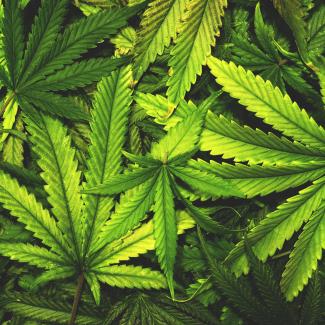Fevers are the immune system’s natural response to infections. When an individual’s core body temperature is above 100.5º Fahrenheit, it is more difficult for bacteria and viruses to reproduce, allowing the body to fight off infections. Cannabinoids are immunomodulators, meaning they may stimulate or suppress the immune system. Therefore, marijuana has an interesting relationship with regulating body temperature and fevers. Tetrahydrocannabinol (THC), the main psychoactive component of cannabis, may affect one’s body temperature in numerous ways. However, most research shows that marijuana is only likely to cause a notable change in body temperature when used in very high doses.
DOES MARIJUANA HELP FEVERS?
Because fevers and inflammation may help the immune system produce antibodies to fight off infections, it is typically not recommended to use marijuana during an infection, as it could cause the virus to multiply. However, on some occasions, the body continues to produce high levels of cytokines (small proteins that signal the brain to increase the thermal set point) after the infection has been successfully fought off, causing the fever to last longer than necessary. This is known as a “cytokine storm” and may result in organ and bone damage, as well as widespread inflammation. In this case, medical cannabis may help the fever.
With regards to marijuana and body temperature, generally, very high doses of marijuana have the potential to lower body temperatures. A 2017 study published in Drug and Alcohol Dependence displayed consistent decreases in lab animals’ body temperatures following THC exposure. Additionally, research from a 2018 study published in Pharmacology and Biochemistry Behavior suggests that it may be possible to develop a tolerance to THC’s heat loss effects. However, this tolerance was only displayed in lab rats over the course of four days, so more research is necessary to understand the long-term effects on humans.
CAN MARIJUANA CAUSE FEVERS?
Overall, marijuana has not been shown to cause fevers. In fact, the aforementioned Drug and Alcohol Dependence study displayed THC’s tendency to actually lower the body temperatures of lab animals. THC-induced hypothermia stems from the activation of cannabinoid receptors in the central nervous system. However, the lab rats from the above Drug and Alcohol Dependence study only displayed clinical hypothermia following their largest doses of THC.
Although marijuana has been shown to affect body heat, these changes are usually minimal. Cannabis can impact different users in different ways, as some get cold shakes when using marijuana, and others feel warm. Significant effects on body temperature are unlikely to stem from lower doses of THC.
CBD AND BODY TEMPERATURE
Regarding information about CBD, cannabidiol (CBD) is a non-psychoactive ingredient in cannabis that has often been used as medicine throughout history. It is important to note that CBD and THC have some crucial differences regarding their effects on body temperature. CBD’s effects on fevers are not entirely certain, due to the lack of randomized, controlled trials. Anecdotal evidence suggests that CBD may help reduce fevers, but a 2021 lab animal study published in the Journal of Ethnopharmacology suggests that CBD is not likely to reduce a fever if an infection is present. Therefore, CBD’s effectiveness in treating a fever depends on the fever’s cause.
When the fever is caused by an autoimmune disorder, there is usually not an infection present in the body, meaning the body is overreacting to a nonexistent threat. When there is no infection present, CBD has the potential to reduce inflammation, pain, and occasionally, fevers. Although CBD may not directly affect the fever itself, it may suppress the immune system, potentially allowing the fever to subside.
On the other hand, the aforementioned 2021 study published in the Journal of Ethnopharmacology demonstrated that in the presence of a bacterial infection, CBD may reduce pain and inflammation, but it typically does not have an impact on the fever. This may be perceived as one of CBD’s benefits, since fevers are often helpful in fighting off infections.
It is important to note that regardless of the fever’s cause, CBD has not been shown to directly impact the fever itself. A 2011 review published in Current Drug Safety and a 2017 study published in Cannabis Cannabinoid Research both suggest that CBD does not affect body temperature. However, CBD may provide other benefits to patients with high fevers, such as reducing inflammation, regulating the immune system, protecting against fever-induced brain damage, and allowing the patient to rest. Additionally, a 2022 study published in Science Advances suggests that CBD may prevent some viruses from replicating. See below for more information regarding the effects of CBD on the symptoms, risks, and potential complications of fevers.
Inflammation and Immune System Regulation
According to a 2015 study published in Acta Physiological, CBD may inhibit proinflammatory cytokines, in turn, reducing migration and lowering inflammation. Because cytokines are a primary means of fever activation, CBD may indirectly lower fevers.
Brain Protection
Seizures are a potential complication of fevers, and a 2020 study published in Pharmacological Research suggests that CBD may help prevent these seizures by protecting the brain. Therefore, CBD’s potentially neuroprotective effects may be useful for fever patients.
Relaxation
CBD has been shown to reduce pain and allow users to relax. This may indirectly help treat fevers, as proper rest is crucial when fighting off an infection.
Overall, marjuana and cannabinoids are known to affect the regulatory functions of the hypothalamus (the part of the brain responsible for regulating body temperature), so marijuana-based changes in temperature would make sense. However, these changes are usually mild and pass quickly, as long as marijuana is not used in extremely high doses. Marijuana is not likely to cause notable issues regarding body heat, but medical marijuana users are recommended to consult with a marijuana doctor for guidance on safe and proper usage. For those seeking medical cannabis treatment, make sure to look at the qualifying conditions for obtaining a medical marijuana card in your state. Additionally, some states allow marijuana and cannabis products to be sold to all adults ages 21+. It is recommended to contact a marijuana doctor in your area to begin the process.
























